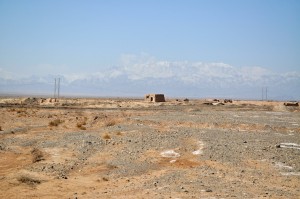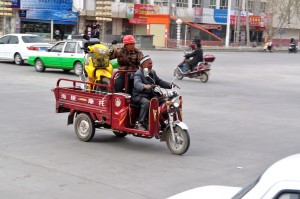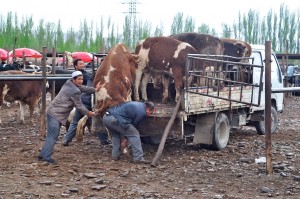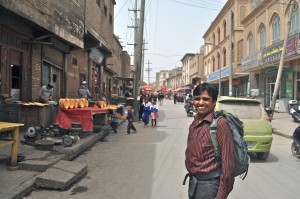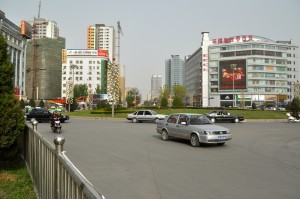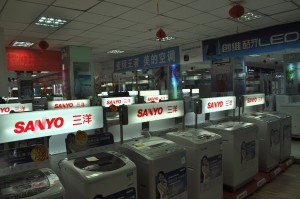Everything packed in our land cruisers, we began the two day drive from Yilik to Kashgar via Yarkand. The early part of the journey was on unmade roads and it was clear that the thaw had had an impact. The rising temperatures had allowed the ice to release its grip on rocks above the road and many had taken advantage of their new found freedom and come crashing down on to the road. We had to negotiate our way through some significant rock falls.
From Mazar the road was clearer, but no less bumpy, as we climbed steadily to the top of the first pass. Here, there was more snow from the recent storm we had experienced on our trek out, and the surface of the road held different problems for the drivers, who sometimes found it difficult to maintain control of the back end of their vehicles. The first pass crossed we began the long descent to the village, where we would encounter our first check point and have lunch. As we were leaving a sensitive area, rather than entering, the formalities did not take too long. Somewhere in the back of the land cruiser, among the bags etc. I lost my lunch, so I visited a roadside cafe/shop and bought, what can best be described as, a pot noodle. The boiling water and spice sachets were added and I waited. After five minutes I was able to tuck in. It nearly blew my head off, causing great hilarity in the cafe among the staff and the other customers. One of the ladies took the pot from me, drained the liquid, added more, stirring it to dilute the spices, drained it again before adding more water and returning it to me. It was now a bit tasteless.
Again we climbed as we crossed the second, more spectacular pass, which now had less snow. The descent gradually took us out of the mountains and into the Taklimakan Desert, a flat, barren landscape. Or is it barren? All along the banks of the Yarkand River it is green for some distance on either bank. The fertile area is made up of small fields of wheat or barley with rows of almond and apricot trees providing colour and shade. The trees were full of blossom. At various points there were little conical clay ovens, which are lit at times when there is a risk of frost. They provide just enough heat to stave off frost damage. Also, occasionally, there were rows of beehives to take advantage of the blossom. Amongst all of this there were thousands of poplar trees lining the tracks and separating the the fields. These provide shelter from the desert winds and also provide a source of building material. However, whenever a villager wants to take down a tree he must replace it in order to maintain the status quo.
Near Yarkand, we left the motorway and, surprisingly, at the end of the slip road there was nothing. The roads off have not yet been built and, having been on a modern motorway, we found ourselves transported back a couple of centuries on to dirt tracks through the fields and farm houses. There seemed to be some confusion about the way to Yarkand. The route in led us to believe it was quite a small place but when we eventually hit tarmac again and headed towards the town centre it proved, yet again, to be a city of several hundred thousand. One moment we were in quiet countryside with no inkling that there was a large city nearby, hidden by layers of poplar trees. The next we were in the thick of it with traffic, people, noise and lights all around us. It sprang up out of nowhere.
Our hotel, Queen Hotel, was right in the centre of town. It was not the hotel we should have been in but the government had taken over ours for a conference. The room rates, as advertised in reception, amused us. There were all the usual rooms, ‘single, twin double’ etc. but there were also some ‘o’clock rooms’ at 68 Yuan per hour. It was noticeable by the nature of some of the women and the shiftiness of the men that the ‘o’clock rooms’ were quite popular. The shower proved popular with us!!!
The following morning we continued our journey to Kashgar. The speed and extent of the building development running parallel to the motorway and, nearby, new railway is phenomenal. Agriculturally, the desert is being cleared of surface stones and the soil underneath irrigated and fertilised at an alarming rate. The railway, which is not fully functional yet, has stations in the middle of nowhere, and then you look closely at the desert and you see lots of white surveyor’s sticks marking out the next phase of development on a huge scale.
On the way to the trek we stopped at a services, which was nothing more than a large flattened area of desert. As we drove past it on our return journey there were already two buildings erected on the site with more to follow. An army of workers had pitched their tents adjacent to the services so the work could be completed as quickly as possible.
Lunch time saw us arrive in Kashgar. The blossom was out and the trees were in leaf but it was cold with a stiff breeze and light rain, the first rain we had encountered all trip. Skipping lunch, the bus took us to the famous animal Sunday market. It was raining and our journey was marred by a dead child lying in the road, the victim of a collision with a vehicle. This was the first such incident we had seen, although I am sure it must be a fairly regular occurrence when pedestrians and vehicles vie for position in the road. Drivers seem very reluctant to give in, even to the laws of the road. We have found on several occasions that although we were given the green light on a crossing we were never safe. I am sure there will be more accidents as roads become faster and more congested. Only this morning we saw children as young as three and four playing on the central reservation of the motorway. The animal market was beginning to wind down but it was amusing to watch impossibly large cattle being manhandled on to impossibly small trailers.
In the evening we went to a restaurant for dinner and entertainment. We were the guests of Keyoum, the director of Kashgar Mountaineering Adventure. The meal was Chinese and absolutely stunning, probably the best Chinese meal I have ever had. Don’t ask what we had; plate after plate of delicious food just kept coming. The entertainment was also excellent, not lasting too long but giving us a taste of the culture, with the obligatory audience participation at the end.
Back at the hotel a few of us chose to visit the KTV floor, affectionately known amongst us as the KY Jelly Bar. We had been warned to stay away, largely by Akbar who indicated that they were not suitable places for us. It’s a bit like telling a child not to do something.
Emerging from the lift on the 5th Floor I went in search of the bar. There were lots of mirrors, coloured lighting and wailing voices. When I asked where the bar was we were led along a corridor past rooms full of people making lots of noise and into a room of our own. The room consisted of a long couch, a coffee table, a large screen TV and a computer. Drinks were brought in, along with two microphones. The TV and computer were switched on and the 1960s and ’70s music began to play. The wailing we had heard before was from people trying to sing their favourite songs. We had a bizarre selection from the Carpenters to Yellow Submarine and we soon discovered that we could wail as well as the next room. Beers drunk we were told we could have three more without extra cost; presumably we had paid for the room and a certain number of beers. I have to confess, that while it was fun initially, the novelty wore off and a sleep in my own bed seemed to be a more attractive option. I was quite pleased that, having finished the second beers we all decided to get out and retire for the night.
The next day was much warmer and a free day in Kashgar, although I was committed to meeting with Keyoum and Hira. While I waited in the reception area, in the company of the SWAT team, I was amused to watch a water tanker with a powerful hose wash the dust off the trees. The operator seemed oblivious to anybody or anything that may be on the other side of the trees; a man sitting on a bench talking into a mobile phone, a news kiosk and a couple of women strolling innocently. The amazing thing was that nobody overreacted, got angry or protested. Perhaps they did not wish to draw themselves to the attention of the numerous police or the SWAT team sitting comfortably in the window near me.
The meeting with Keyoum was fairly brief and mainly concerned settling up the finances of the expedition. I refrained from being critical – not the time or the place and anyway Hira would be the one to assess the positives and negatives. Hira and Keyoum then went off for a meeting of their own, with Hira promising to be back soon to go into town with me. When he returned we ventured into the predominantly Uygar part of town for some lunch at the Karakorum Cafe. On the way we met Simon and Rob who, like little boys at Christmas, were excited and eating everything in sight!
After lunch Hira and I split up, he to return to his hotel, me to do some shopping. I had a fair idea what I wanted so it did not take too long.
Every so often during the trek and a couple of times since I had the odd twinge in my back, largely, I think, the result of spending long periods horizontal in a tent that was really not big enough for me. I wanted a massage, but unfortunately the spa in our hotel was, for some reason, closed. I asked at reception if they could recommend somewhere and they suggested another hotel, bundled me into a taxi with a map and a bit of paper with Chinese writing on it, and off I went. The hotel was not far away and I soon found myself in reception speaking to people with no English who thought I wanted a single room. The bit of paper did not throw any light on the situation. I was about to give up when a Chinese lady asked, ‘Can I help you?’ Relieved to meet somebody who could speak English, I began to explain. We continued to struggle because it soon became apparent that the extent of her English did not go much beyond, ‘Can I help you?’ Having established I did not want a room, not even an o’clock room, and that I did not want a pedicure on the third floor, I finally got the message across that I wanted a massage. That was on the fifth floor. Emerging from the lift I was greeted by a number of faces, none of whom could speak English. However, it was clear that I was requiring a massage. Why else would I get out of the lift on the fifth floor. I was taken to a room and left sitting on a bed. A few moment later a large young man came in and put the fear of God in me. He was wearing a sweat shirt, tracksuit bottoms tucked into blue wellies. What frightened me most was the size of his hands. On the plus side, he could speak a little faltering English and I was able to establish that it was going to cost me 80 Yuan (£8) for an hour with this brute. I could not back out now. I was committed. I was just going to have to man up and take what was coming to me. A pair of silk pyjamas were produced, which I obediently changed into before being instructed to lie on the bed on my back. If I close my eyes I can use my imagination. On hearing the door click shut I opened my eyes and was surprised, and pleased, to see that the incredible hulk had transformed into a young, slim Chinese girl, who then proceeded to beat me up. Between bouts of pain, she tickled me and our only communication was an occasional smile or chuckle. At the end of the hour she got up and left. I got dressed and left. Phew! It was a close shave and I dread to think what the brute would have done to me had he got his hands on me.
Relieved, I walked back to the hotel via the Chinese shopping district. It is such a contrast to the Uygar area, which in many respects is still Third World. In the modern city where everybody is upwardly mobile it is all about consumerism. Advertising sells all the latest gadgets and the shops are full to the brim with electrical goods and the latest fashions. Mao must be turning in his grave. No longer are the Chinese conformist but they are individuals with ambition.
In the evening we said our thanks to Akbar who could not be with us when we left China as he had a driving test. We then went out for a meal where we expressed our thanks and said our farewells to Hira.

